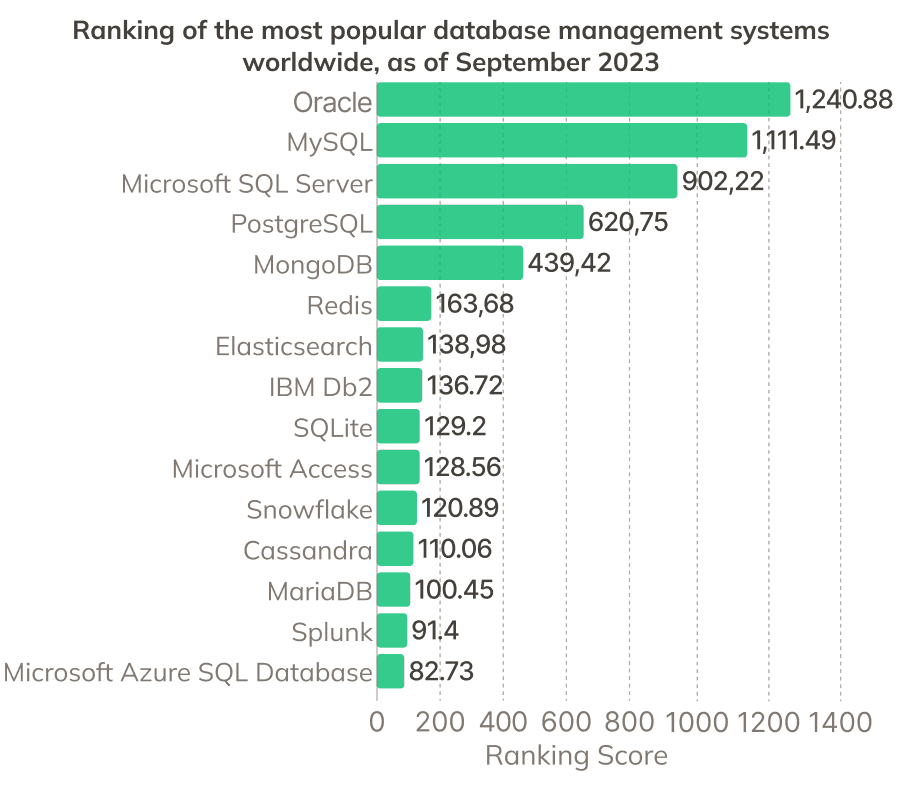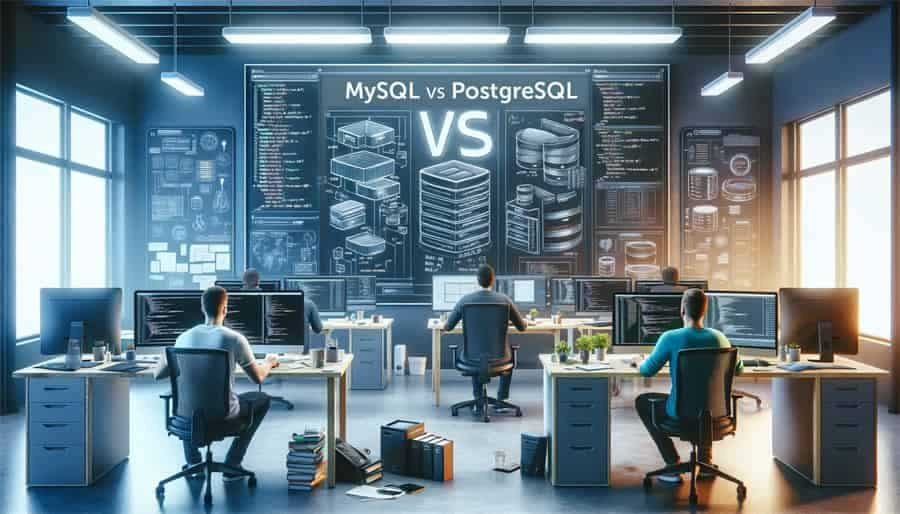MySQL vs PostgreSQL: Choose the Right Database for Your Project
Topic: Tech

April 23, 2024
The choice of a database management system (DBMS) can have a profound impact on the success of your project. According to a recent survey by Stack Overflow, MySQL and PostgreSQL are among the top five most popular databases used by professional developers worldwide.
With the ever-increasing demand for efficient data storage and retrieval, choosing the right database technology is crucial for ensuring optimal performance, scalability, and long-term viability of your application.
In this article, our goal is to provide a comprehensive comparison of MySQL and PostgreSQL, two of the most widely used open-source relational database management systems (RDBMS). We will delve into their features, capabilities, and real-world applications, empowering you to make an informed decision on which database best suits your project's requirements and business goals.
Whether you're an app owner, entrepreneur, startup founder, or simply an individual with an interest in IT innovations and software development, this guide will equip you with the knowledge necessary to choose the right database for your endeavor.

Features and Capabilities of MySQL
MySQL is an open-source relational database management system that has gained immense popularity due to its high performance, ease of use, and widespread adoption. Now developed by Oracle Corporation, MySQL is known for its speed, reliability, and scalability, making it a go-to choice for many web-based applications and online transaction processing systems. Let’s take a look at its key features!
Feature | Description |
|---|---|
High Performance | MySQL is designed to deliver exceptional performance for read-intensive workloads, making it an excellent choice for applications that require fast data retrieval, such as content management systems, e-commerce platforms, and web applications. |
Replication | MySQL offers robust replication capabilities, enabling data to be replicated across multiple servers, and ensuring high availability and load balancing. |
Partitioning | MySQL supports data partitioning, which allows large databases to be divided into smaller, more manageable parts, improving performance and scalability. |
Ease of Use | MySQL is known for its simplicity and ease of use, with a straightforward installation process and a user-friendly interface, making it accessible to developers of all skill levels. |
Cross-Platform Compatibility | MySQL is compatible with multiple operating systems, including Windows, Linux, and macOS, providing flexibility and portability for developers working in different environments. |
MySQL seamlessly integrates with various programming languages, including Python, Ruby, PHP, and Node.js, making it a popular choice for web development and e-commerce applications. Its widespread adoption has led to the development of a vast ecosystem of tools, libraries, and resources, further enhancing its appeal among developers.
While MySQL excels in read-intensive workloads and provides robust replication and partitioning features, it may not be the ideal choice for applications that require very high-read workloads, advanced data types, or strict adherence to data integrity principles. In such cases, PostgreSQL may offer a more suitable alternative, as we'll explore in the next section.
Features and Capabilities of PostgreSQL
PostgreSQL, on the other hand, is an object-relational database management system (ORDBMS) that offers advanced features and robustness. Known for its adherence to SQL standards, PostgreSQL is renowned for its ACID compliance, support for complex queries, and extensive data integrity features. It is also a popular choice for NoSQL features.
Feature | Description |
|---|---|
ACID Compliance | PostgreSQL strictly follows the ACID (Atomicity, Consistency, Isolation, Durability) principles, ensuring data integrity and reliability, making it suitable for mission-critical applications. |
Advanced Data Types | PostgreSQL supports a wide range of advanced data types, including arrays, JSON, and even custom data types, providing flexibility in storing and managing complex data structures. |
Powerful Query Language | PostgreSQL offers a rich query language with support for advanced SQL features, such as window functions, common table expressions, and recursive queries, enabling efficient data manipulation and analysis. |
Robust Data Integrity | PostgreSQL provides advanced mechanisms for data validation and error handling, ensuring data consistency and reliability, making it a preferred choice for applications that require strict data integrity. |
Extensibility | PostgreSQL is highly extensible, allowing developers to create custom data types, functions, and even entire procedural languages, facilitating seamless integration with existing systems and enabling the development of complex applications. |
PostgreSQL's compatibility with various programming languages, including Python, Java, PHP, Ruby, and Node.js, further enhances its versatility and adoption across different development environments.
Its active and dedicated community contributes to the continuous improvement and development of new features and tools, ensuring that PostgreSQL remains a reliable and cutting-edge database management system.
While PostgreSQL offers advanced features and robust data integrity, it may not be the ideal choice for applications that require exceptional performance for simple data retrieval tasks. In such cases, MySQL may be a more suitable option, as its optimizations cater to these specific requirements.
MySQL vs PostgreSQL: Performance Comparison
When it comes to performance, both MySQL and PostgreSQL are highly capable databases, but their strengths lie in different areas. MySQL is generally considered faster for read-intensive workloads, while PostgreSQL excels in complex queries and write-intensive operations.
In terms of scalability, MySQL has traditionally been ahead due to its efficient replication and partitioning features. However, PostgreSQL has made significant strides in improving its scalability capabilities with features like logical replication and horizontal partitioning.
Data Integrity Features in MySQL and PostgreSQL
Data integrity and security are paramount considerations when choosing a database management system. PostgreSQL is widely recognized for its robust data integrity features, strictly adhering to the ACID principles and providing advanced mechanisms for data validation and error handling.
Both MySQL and PostgreSQL offer comprehensive security features, including user authentication, data encryption, and access control mechanisms. However, PostgreSQL is generally considered more secure out of the box, with features like mandatory access control and row-level security.
Extensibility Options in MySQL and PostgreSQL
PostgreSQL is renowned for its extensibility, allowing developers to create custom data types, functions, and even entire procedural languages. This flexibility enables seamless integration with existing systems and facilitates the development of complex applications.
While MySQL also offers extensibility through plugins and user-defined functions, PostgreSQL is generally considered more flexible and better suited for handling complex data structures and advanced data processing requirements.
Community Support and Ecosystem
Both MySQL and PostgreSQL have thriving and active communities, providing extensive documentation, forums, and resources for developers. However, MySQL has a larger user base and a more extensive ecosystem of tools and integrations, particularly in the web development and e-commerce domains.
PostgreSQL, on the other hand, enjoys a strong following among enterprises and organizations that require robust data integrity, advanced features, and support for complex queries.

Case Studies and Real-World Examples
MySQL has been the database management system of choice for numerous high-profile web-based companies and applications due to its ability to handle large volumes of data efficiently and its scalability to support rapidly growing user bases. Some prominent examples include:
-
Facebook: As one of the largest social media platforms with billions of active users, Facebook relies on MySQL to store and manage user data, posts, and other content-related information. MySQL's high performance and scalability have been instrumental in supporting Facebook's massive data processing requirements.
-
Twitter: Twitter's real-time feed updates and high write load make MySQL an ideal choice for storing and retrieving user tweets, mentions, and other user-generated content. The database's replication capabilities and sharding techniques have allowed Twitter to scale its infrastructure horizontally.
-
Airbnb: The popular vacation rental platform uses MySQL to manage its listings, user profiles, and booking data. MySQL's speed and flexibility have enabled Airbnb to provide a seamless user experience while handling millions of listings and transactions.
-
WordPress: As one of the most widely used content management systems, WordPress leverages MySQL as its primary database for storing and managing website content, user data, and plugin information. MySQL's ease of use and compatibility with various hosting environments have contributed to WordPress's widespread adoption.
On the other hand, PostgreSQL has gained popularity in industries where data integrity, advanced features, and compliance with standards are critical requirements. Here are some notable examples:
- Finance and Banking: Companies like Skrill, a leading digital wallet provider, and numerous banks and financial institutions have chosen PostgreSQL for its robust transaction support, data integrity features, and adherence to industry standards like ACID compliance.
- Healthcare: The healthcare industry often deals with sensitive patient data and strict regulatory requirements. Companies like Cerner, a leading provider of healthcare information systems, and biotechnology firms have adopted PostgreSQL for its advanced data security features, such as row-level security and encryption capabilities.
- Government and Public Sector: Government agencies and public sector organizations have stringent data security and compliance requirements. PostgreSQL's robust security features, auditing capabilities, and support for advanced data types make it a popular choice in this sector. Examples include the U.S. State Department and various government agencies in different countries.
- Entertainment and Media: Companies like Reddit, the popular online discussion platform, and Spotify, the music streaming service, have leveraged PostgreSQL's full-text search capabilities, support for complex data types (like JSON and XML), and advanced query optimization features to power their data-intensive applications.
These real-world examples demonstrate the diverse use cases and industries where MySQL and PostgreSQL have found success, catering to different requirements and priorities.

How to Choose the Right Database for Your App
When selecting between MySQL and PostgreSQL, consider the following factors:
- Performance requirements: If your application has relatively simple queries, it is read-intensive, and requires high-speed data retrieval, MySQL may be a better choice. If you need to handle complex queries, write-intensive workloads, or advanced data types, PostgreSQL could be a more suitable option.
- Scalability needs: If you anticipate your project to grow rapidly and require horizontal scaling, MySQL may have an edge with its efficient replication and partitioning features. However, PostgreSQL has also improved its scalability capabilities in recent years.
- Data integrity and compliance: If your project deals with sensitive data or requires strict adherence to data integrity principles, PostgreSQL is the safer choice due to its ACID compliance and advanced data validation features.
- Flexibility and extensibility: If you expect to work with complex data structures or require custom data types and functions, PostgreSQL offers greater flexibility and extensibility options.
- Ecosystem and community support: Consider the ecosystem and community support available for each database. MySQL has a larger user base and more extensive tools and integrations, particularly in the web development and e-commerce domains, while PostgreSQL has a strong following in enterprise and mission-critical applications.
Conclusion
In the ever-evolving landscape of software development, database selection is a critical decision that can significantly impact the success of your project. Both MySQL and PostgreSQL are powerful open-source relational databases, each with its own strengths and capabilities. MySQL shines in its high performance, scalability, and ease of use.
Therefore, it is an excellent choice for web-based applications, e-commerce platforms, and read-intensive workloads. On the other hand, PostgreSQL excels in its ACID compliance, support for complex queries, advanced data types, and robust data integrity features, making it an ideal choice for mission-critical applications, enterprise systems, and projects that prioritize data reliability and security.
Ultimately, the decision between MySQL and PostgreSQL should be driven by a careful evaluation of your project's specific requirements, performance needs, scalability demands, and the level of data integrity and compliance required. By considering the factors discussed in this article, you can make an informed choice and select the database that best aligns with your project's goals and long-term vision.
Cyfrania developers possess expertise in both MySQL and PostgreSQL. It gives them several advantages while working with our customers:
- Project flexibility: We choose the optimal DBMS based on your project's specific needs. To be honest, we choose PostgreSQL by default because it is better suited for cases where all the requirements for a project that needs to be developed from scratch are not known in advance.
- Reduced vendor lock-in risk: Our expertise allows for smooth transitions between platforms if needed.
- Broadened team knowledge: Exposure to diverse DBMS strengthens our problem-solving abilities.
- Efficient data portability: We handle data migration between MySQL and PostgreSQL seamlessly.
If you have any questions related to MySQL and PostgreSQL, or others, feel free to contact us.
Sources for Further Reading
- PostgreSQL vs MySQL - a video from IBM Technology
- What’s the Difference Between MySQL and PostgreSQL? - an article on Amazon Web Services
- In what circumstances is MySQL better than PostgreSQL? - a discussion on Reddit
- What is the difference between MySQL and PostgreSQL? - a discussion on Quora
- Postgres vs MySQL - an article on Medium
- What is Database & SQL? - a video from Guru99